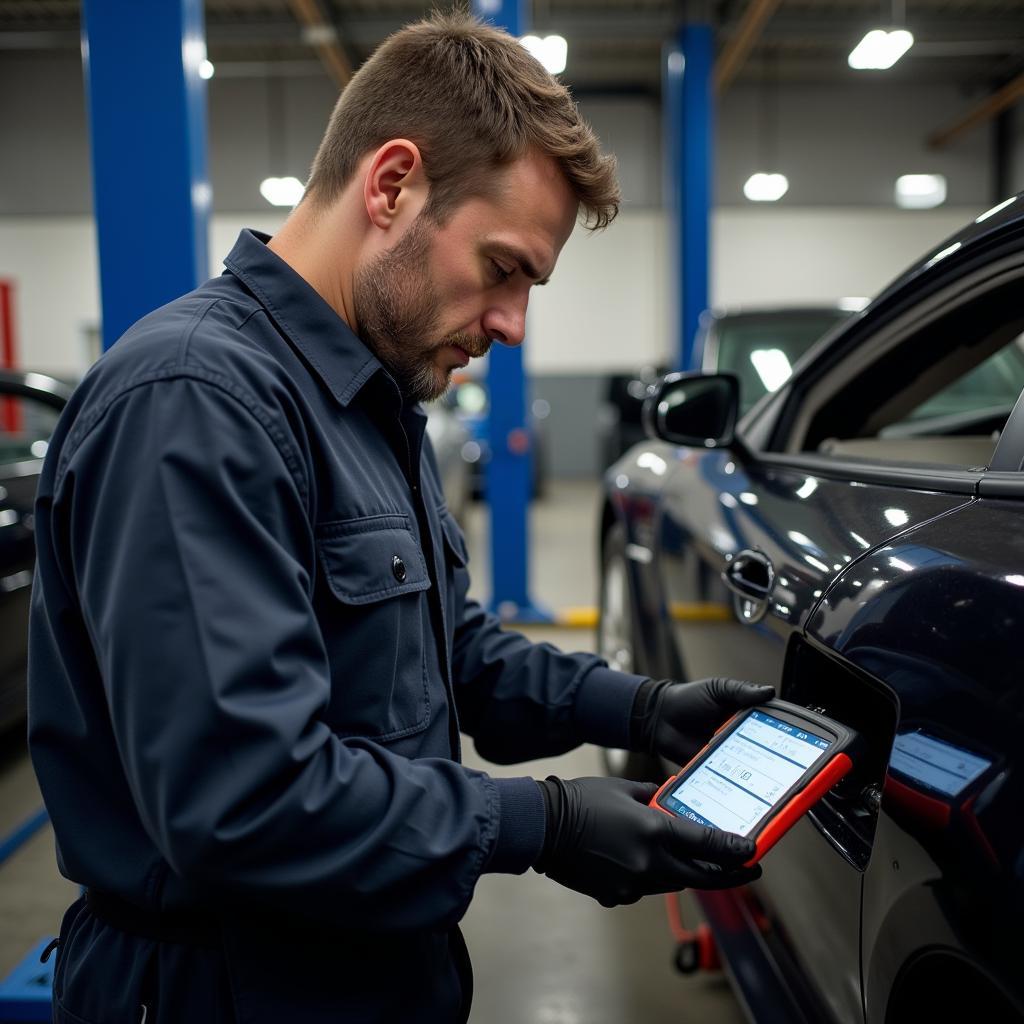Car diagnostics, in the simplest terms, refers to the process of identifying problems within a vehicle. Just like a doctor uses various methods to diagnose a patient, car diagnostics involve specialized tools and techniques to pinpoint issues affecting your car’s performance, safety, and emissions.
Delving Deeper: What Does Car Diagnostics Entail?
Imagine this: Your car starts sputtering, the “check engine” light throws a tantrum on your dashboard, or your fuel efficiency suddenly nosedives. These are your car’s desperate cries for help, urging you to investigate what’s wrong. This is where car diagnostics swoop in to save the day.
Car diagnostics involve plugging a diagnostic code reader car into your car’s onboard computer, the Engine Control Unit (ECU). This nifty device acts as a translator, deciphering the ECU’s cryptic error codes into understandable language. These codes point to specific areas or components within your car that need attention.
Why is Car Diagnostics Important?
Gone are the days of mechanics relying solely on their intuition and a trusty wrench. Modern vehicles are complex machines with intricate electronic systems. Car diagnostics provide a more accurate, efficient, and, dare we say, smarter approach to car repair and maintenance.
Here’s why car diagnostics is indispensable:
-
Accurate Problem Identification: Forget about playing the guessing game with your car troubles. Car diagnostics pinpoint the root cause of the issue, saving you time, money, and potential headaches from unnecessary repairs.
-
Improved Car Performance: A well-diagnosed car is a happy car. By addressing underlying problems, you can restore your car’s performance, fuel efficiency, and overall drivability.
-
Enhanced Safety: Faulty components can compromise your safety and that of your passengers. Car diagnostics helps identify potential safety hazards before they escalate into major (and potentially dangerous) problems.
-
Environmentally Friendly: A car running in tip-top shape emits fewer pollutants. Regular car diagnostics contribute to a greener environment by ensuring optimal engine performance and reduced emissions.
Unraveling the Mystery: Types of Car Diagnostic Tests
Car diagnostics encompass a range of tests tailored to different systems and components. Some common types include:
-
On-Board Diagnostics (OBD) Scan: This is the most basic type of car diagnostic test, reading the error codes stored in your car’s ECU. An smart car diagnostic reader can perform this test.
-
Sensor Diagnostics: Your car is teeming with sensors that monitor everything from engine temperature and oxygen levels to tire pressure and airbag deployment. Car sensor diagnostics evaluate the health and accuracy of these crucial components.
-
Exhaust System Analysis: This test checks the efficiency of your car’s exhaust system, ensuring it effectively converts harmful pollutants into less harmful substances.
-
Electrical System Check: A car’s electrical system is its lifeline. This test examines the battery, alternator, starter, and wiring for any faults or malfunctions.
 Mechanic Using Diagnostic Tool
Mechanic Using Diagnostic Tool
Navigating the World of Car Diagnostics
While the thought of car diagnostics might seem intimidating, it doesn’t have to be. Understanding the basics can empower you to make informed decisions about your car’s well-being.
Here are a few takeaways to remember:
- Regular car diagnostics are essential for maintaining your car’s health, performance, and safety.
- If your car throws any warning lights or exhibits unusual behavior, don’t ignore them! Get a car diagnostic test as soon as possible.
- Many auto repair shops and dealerships offer car diagnostic services.
- Consider investing in a diagnostic check tool for older cars for basic diagnostics at home.
Expert Insight:
“Car diagnostics has revolutionized the way we approach car repair,” says John Smith, a seasoned automotive engineer with over 20 years of experience. “It provides a level of precision and efficiency that was unimaginable in the past.”
Car Diagnostics: The Future of Car Care
As technology continues to advance, so too will the field of car diagnostics. We can expect even more sophisticated tools and techniques to emerge, providing deeper insights into our vehicles’ inner workings.
The future might even see AI-powered diagnostic systems that predict potential problems before they occur, further enhancing car maintenance and minimizing unexpected breakdowns.
Conclusion
Car diagnostics, in essence, is about understanding your car’s language. By deciphering the cryptic codes and signals, we can ensure our vehicles stay in top shape, delivering a smoother, safer, and more enjoyable driving experience.
FAQs about Car Diagnostics
1. How often should I get my car diagnosed?
It’s generally recommended to get your car diagnosed at least once a year or every 12,000 miles, whichever comes first. However, if you notice any warning lights or unusual behavior, don’t hesitate to get it checked sooner.
2. Can I perform car diagnostics myself?
Yes, you can perform basic car diagnostics at home using an OBD-II scanner, which is relatively inexpensive and easy to use. However, for more complex issues, it’s best to consult a professional mechanic.
3. What is the difference between OBD-I and OBD-II?
OBD-I was an early version of onboard diagnostics, while OBD-II is the standardized system used in most cars manufactured after 1996. OBD-II provides more comprehensive diagnostic information and uses a standard connector.
4. What should I do if my check engine light is on?
If your check engine light is on, it’s crucial to get your car diagnosed as soon as possible. The light could indicate a minor issue or a more serious problem that requires immediate attention.
5. How much does car diagnostics cost?
The cost of car diagnostics can vary depending on the location, the complexity of the issue, and the hourly rate of the mechanic. On average, you can expect to pay between $50 and $150 for a basic diagnostic test.
Don’t forget to explore our other informative articles on car diagnostics:
Need Expert Assistance?
Contact us via WhatsApp: +1(641)206-8880 or Email: [email protected] for 24/7 support from our dedicated customer service team. We’re always here to help you navigate the world of car diagnostics.

Leave a Reply